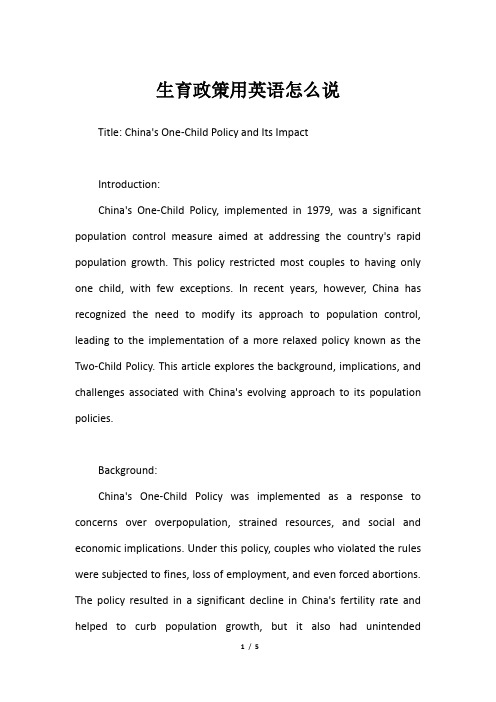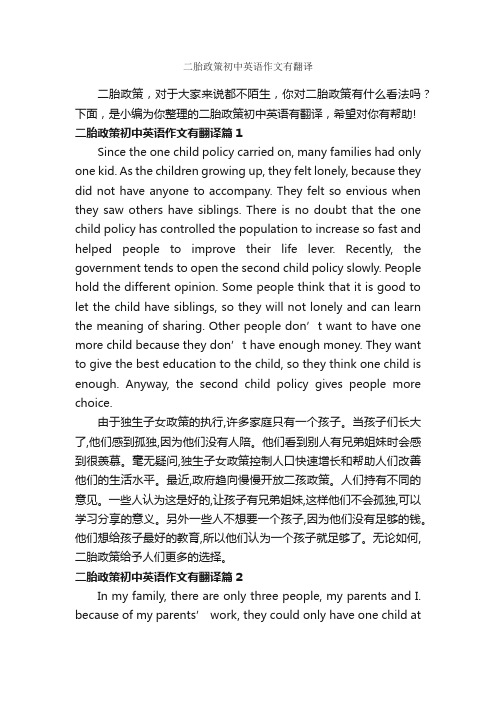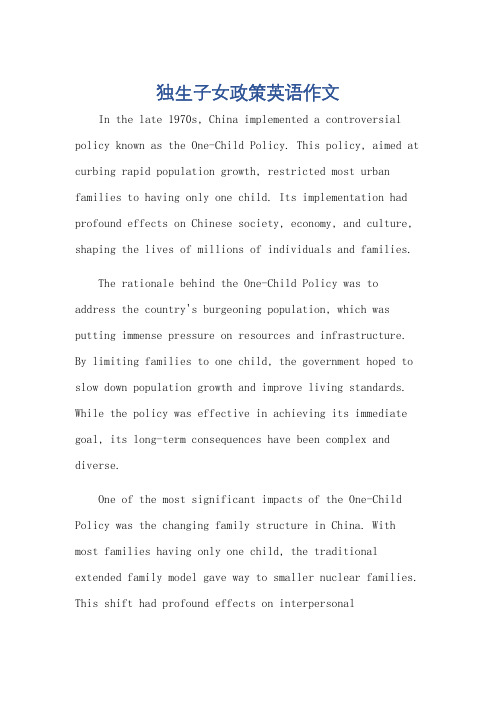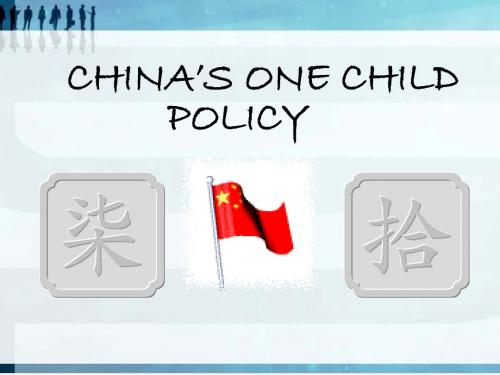one child policy _0
计划生育政策英语

计划生育政策英语计划生育政策[jìhuàshēnɡyùzhènɡcè]family planning policy; one-child policy双语例句全部family planning policy one-child policy1.计划生育政策实施30多年来,广大计划生育家庭为国家降低人口数量、节约社会抚养费用、提高人均GDP等做出了巨大的贡献。
Family planning policy have brought into effect in China about 30 years, a lot of families which practice family planning have made a great contribution to reduce population, save social alimony and improve GDP per person.2.中国将继续实施计划生育政策,以控制人口增长。
China will continue to carry out its family planning policy to control population growth.3.他们积极拥护计划生育政策。
They are very aggressive in pursuing the policy of birth control.4.事实上,就至少一个目标而言,在世界上的某些地方我们已经取得了巨大的进步——实施计划生育政策以及相应地向小型家庭过渡。
Indeed, we have made substantial progress in some parts of the world on at least one of these ——the distribution of family-planning services and the associated shift to smaller families.5.计划生育政策在中国已施行30年之久。
独生子女政策One Child Policy _英语作文

独生子女政策One Child PolicyChinais thelargest population country in the world, which increase the difficulty todevelop china well. Consider Chinese development in the long term, some peoplepoint out that it is necessary for Chinese to carry out one child policy. However,there are opposite voice. They think one child policy is not good for children’shealthy grow up. I agree with the latter opinion. The reasons are as follows. 中国是世界上人口最多的国家,这就加大了发展中国的难度。
从中国的长远发展来看,有些人指出在中国实行独生子女政策是有必要的。
然而,也有反对的声音。
他们认为独生子女政策不利于孩子们的健康成长。
我同意后者的观点。
理由如下。
First of all, one child policy will make childrenfeel lonely. One child policy means every couple just has one child. The childhas no sisters or brothers to play with him. As time passes, they will feellonely. We all know that there is not everything children want to tell theirparents. Growing up with no brother or sister, the child may easy to get mentalproblem, such as, autism. In addition, as every parent just has one child, theywill spoil their child double times.As a result, the child will the so called littleemperor or little princess. When the child grows up, it is possible thathe couldn’t adjust the world, the society, because no one will treat them aslittle emperor or little princess except their parents.首先,独生子女政策会让孩子感到孤独。
生育政策用英语怎么说

生育政策用英语怎么说Title: China's One-Child Policy and Its ImpactIntroduction:China's One-Child Policy, implemented in 1979, was a significant population control measure aimed at addressing the country's rapid population growth. This policy restricted most couples to having only one child, with few exceptions. In recent years, however, China has recognized the need to modify its approach to population control, leading to the implementation of a more relaxed policy known as the Two-Child Policy. This article explores the background, implications, and challenges associated with China's evolving approach to its population policies.Background:China's One-Child Policy was implemented as a response to concerns over overpopulation, strained resources, and social and economic implications. Under this policy, couples who violated the rules were subjected to fines, loss of employment, and even forced abortions. The policy resulted in a significant decline in China's fertility rate and helped to curb population growth, but it also had unintendedconsequences.Implications of the One-Child Policy:1. Gender Imbalance: The preference for male heirs and the societal pressure to have a male child led to a significant gender imbalance, with many families resorting to gender-based abortions or even female infanticide. This imbalance has created social issues, including difficulties in finding suitable partners for marriage and potential societal unrest.2. Aging Population: The low birth rate resulting from the One-Child Policy has contributed to an aging population, placing a strain on the country's healthcare system, pension funds, and overall economic productivity.3. Workforce Challenges: With a shrinking labor force, China faced challenges in meeting the demands of its growing economy, leading to labor shortages in some industries.Transition to the Two-Child Policy:Recognizing the need for change, China introduced the Two-Child Policy in 2023. This policy allowed couples to have a second child, aiming to address the issues arising from the One-Child Policy and stimulate population growth. However, despite the policy change, the desired impact has not been fully realized due to various factors.Challenges and Future Outlook:1. Economic Factors: High living costs, long work hours, and career aspirations have led many couples to opt for smaller families or delay having children altogether.2. Cultural Shift: After decades of adhering to the One-Child Policy, some couples are reluctant to have a second child due to the associated financial burdens and increased responsibilities.3. Gender Equality: Addressing the gender imbalance resulting from decades of gender-based preferences and stereotypes requires comprehensive social and cultural changes.Conclusion:China's population policies have undergone significant changes over the past few decades, with the One-Child Policy having a profound impact on the country. While the policy successfully curbed population growth, it also created several challenges such as a gender imbalance and an aging population. The transition to the Two-Child Policy aimed to address these issues, but certain obstacles remain. To ensure sustainable population growth and address the long-term consequences of past policies, China must continue to adapt its approach, considering economic, cultural, and social factors.生育政策是指由政府制定和实施的与人口生育相关的政策。
二胎政策初中英语作文有翻译_初中英语作文_

二胎政策初中英语作文有翻译二胎政策,对于大家来说都不陌生,你对二胎政策有什么看法吗?下面,是小编为你整理的二胎政策初中英语有翻译,希望对你有帮助! 二胎政策初中英语作文有翻译篇1Since the one child policy carried on, many families had only one kid. As the children growing up, they felt lonely, because they did not have anyone to accompany. They felt so envious when they saw others have siblings. There is no doubt that the one child policy has controlled the population to increase so fast and helped people to improve their life lever. Recently, the government tends to open the second child policy slowly. People hold the different opinion. Some people think that it is good to let the child have siblings, so they will not lonely and can learn the meaning of sharing. Other peop le don’t want to have one more child because they don’t have enough money. They want to give the best education to the child, so they think one child is enough. Anyway, the second child policy gives people more choice.由于独生子女政策的执行,许多家庭只有一个孩子。
独生子女政策英语作文

独生子女政策英语作文In the late 1970s, China implemented a controversial policy known as the One-Child Policy. This policy, aimed at curbing rapid population growth, restricted most urban families to having only one child. Its implementation had profound effects on Chinese society, economy, and culture, shaping the lives of millions of individuals and families. The rationale behind the One-Child Policy was to address the country's burgeoning population, which was putting immense pressure on resources and infrastructure. By limiting families to one child, the government hoped to slow down population growth and improve living standards. While the policy was effective in achieving its immediate goal, its long-term consequences have been complex and diverse.One of the most significant impacts of the One-Child Policy was the changing family structure in China. With most families having only one child, the traditional extended family model gave way to smaller nuclear families. This shift had profound effects on interpersonalrelationships, inheritance practices, and even the way people perceived their identity and role in society.The One-Child Policy also had economic implications. As families had fewer children to support, they could invest more resources in educating and providing for their only child. This led to a significant increase in educational opportunities for girls, who had traditionally been denied access to higher education due to cultural biases. The policy also contributed to China's economic boom by ensuring a larger workforce and lower dependency ratios.However, the One-Child Policy also gave rise to several social issues. One of the most significant was the phenomenon of the "left-behind children," who were left in the care of grandparents or relatives while their parents migrated to cities for work. These children often suffered from emotional and psychological problems due to lack of parental care and attention.Another issue was the increasing gender imbalance in China, which was partially attributed to the preference for male children. This preference led to a high number of female fetuses being aborted or neglected, resulting in asignificant gender gap in the population. This gender imbalance has led to social problems such as increased crime rates and marriage difficulties for men.In recognition of these issues, China began to gradually relax the One-Child Policy in 2011, allowing families to have two children if both parents were only children. This policy change aimed to address the gender imbalance and aging population issues while maintaining population control. However, the impact of this new policy remains to be seen, as it will take time for its effects to manifest in the population structure and social fabric of China.In conclusion, the One-Child Policy was a significant milestone in Chinese history, having profound effects on the country's population, economy, and society. While it achieved its immediate goals of population control and economic growth, its long-term consequences have been complex and diverse, giving rise to new challenges and opportunities for China to address in the future.**中国独生子女政策的影响**20世纪70年代末,中国实施了一项引起争议的政策,即独生子女政策。
CHINA'S_ONE_CHILD_POLICY

WHAT IS IT?
China’s One Child policy is a policy that the Chinese government introduced in 1979 to try and solve the problem of overpopulation. It’s main purpose was to make sure that China could support its large population with facilities such as healthcare, education, housing, good jobs and most importantly, food. The aim was to reduce poverty and to improve overall quality of life for the people. The Policy is not formally written into Chinese law but it is strictly enforced with three main factors. These are: •Favouring delayed marriage and delayed child birth. •Favouring fewer and healthier births, rather than more unsuccessful ones •Laying down the rule of one child per couple.
OBEY
DISOBEY
1. Your second child and any others you decide to have will be unregistered. 2. Your second child will not receive any authorised education. 3. You will not be supported with future child birth control.
一孩政策英文作文

一孩政策英文作文英文:One-child policy is a controversial topic in China. As a Chinese, I have mixed feelings about it. On the one hand, I understand the government's intention to control the population growth and alleviate the pressure on resources and environment. On the other hand, I also see the negative effects of the policy on individuals and society.Firstly, the one-child policy has caused gender imbalance. Due to traditional preference for male offspring and the limit on the number of children, many families choose to have a son and abort female fetuses. As a result, there are now more men than women in China, which has led to social problems such as increased crime rates and difficulty in finding a spouse.Secondly, the policy has put pressure on only children. They are often called "little emperors" because theyreceive all the attention and resources from their parents and grandparents. This has led to a sense of entitlementand lack of independence among some only children. Moreover, they have to bear the burden of taking care of their aging parents alone, which can be overwhelming.However, there are also some positive aspects of theone-child policy. For example, it has led to better education and healthcare for children. With fewer childrento support, parents can afford to invest more resources in their child's education and health. Also, the policy has helped to reduce poverty in some areas, as families with only one child can focus their resources on that child'swell-being.In conclusion, the one-child policy has both positive and negative effects on China. As the policy has now been relaxed, I hope that the government can find a better balance between population control and individual rights.中文:一孩政策是一个在中国引起争议的话题。
计划生育政策的英语

计划生育政策的英语Balancing Population Growth: The Discourse on China's Family Planning PolicyAs the world's most populous country, China's family planning policies have long been a topic of intense global scrutiny and debate. Implemented in the late 1970s, the one-child policy was a landmark decision aimed at curbing the country's rapidly growing population and ensuring sustainable development. While this policy faced numerous challenges and controversies, it has significantly impacted China's demographic landscape and continues to shape the discourse on population management.The introduction of the one-child policy was a response to the country's soaring population growth, which had quadrupled in the decades following the establishment of the People's Republic of China in 1949. The policy limited most urban couples to a single child, with rural families allowed to have two children if the first was a girl. This strict measure was accompanied by various incentives and penalties, including access to better healthcare and education for one-child families, as well as fines and job-related sanctions for those who violated the policy.The implementation of the one-child policy was not without its challenges. In some cases, the policy was enforced through coercive measures, such as forced sterilizations and abortions, which drew widespread criticism both domestically and internationally. The policy also led to a significant gender imbalance, as the preference for male children resulted in a higher rate of sex-selective abortions and abandonment of baby girls. This skewed sex ratio has had far-reaching social and economic implications, including a shortage of potential brides and an aging population.Despite these issues, the one-child policy is widely credited with contributing to China's rapid economic growth and development. By slowing the rate of population growth, the policy enabled the country to focus on improving living standards, investing in infrastructure, and enhancing its global competitiveness. Moreover, the policy's implementation coincided with other significant reforms, such as the opening up of the Chinese economy and the adoption of market-oriented policies, which further propelled the country's economic transformation.In recent years, however, the one-child policy has undergone significant revisions in response to the country's changing demographic needs. In 2015, the Chinese government announced the implementation of a two-child policy, allowing all couples tohave up to two children. This policy shift was driven by concerns over the country's aging population, the declining birth rate, and the potential long-term economic consequences of a shrinking workforce.The transition to the two-child policy has been a gradual process, with various regional and national-level adjustments made to address the unique challenges faced by different communities. For instance, some provinces have introduced more flexible policies, such as allowing couples in which either parent is an only child to have two children, or providing financial incentives for families with multiple children.Furthermore, the government has taken steps to address the social and economic implications of the previous one-child policy. Efforts have been made to improve access to healthcare and education for families with multiple children, as well as to promote gender equality and combat the stigma associated with having larger families.As China continues to navigate the complex landscape of population management, the discourse on family planning policies remains a significant area of focus. Policymakers must balance the need for population control with the imperative of ensuring a sustainable demographic structure that can support the country's long-term economic and social development.The evolution of China's family planning policies reflects the ongoing challenge of adapting to changing social, economic, and demographic realities. While the one-child policy played a crucial role in shaping the country's development trajectory, the shift towards a more flexible approach underscores the importance of dynamic and responsive population management strategies.As the global community continues to grapple with issues of population growth and sustainability, China's experience with family planning policies offers valuable insights and lessons that can inform discussions and decision-making processes in other parts of the world. Ultimately, the success of any population management strategy lies in its ability to balance the needs of individuals, families, and the larger societal and environmental context.。
- 1、下载文档前请自行甄别文档内容的完整性,平台不提供额外的编辑、内容补充、找答案等附加服务。
- 2、"仅部分预览"的文档,不可在线预览部分如存在完整性等问题,可反馈申请退款(可完整预览的文档不适用该条件!)。
- 3、如文档侵犯您的权益,请联系客服反馈,我们会尽快为您处理(人工客服工作时间:9:00-18:30)。
one child policy
one child policy
·中国人口现已达13亿,造成了许多不良后果。
降低人口数量势在必行。
独生子女的政策使每个家庭更重视孩子的健康和教育。
学会与他人交流很必要…
·词汇
·family, child, policy, brothers and sisters, population, solve, problem, large, allow, slow down, feel lonely, challenge, necessary, traffic, water problem, chance, take care of, basic, save, energy, improve, economy, food, advantage, carry out, education, environment, society, develop, sooner or later, the standard of living, competition, spoil, comfortable, get on well with
·句式
·1. Friends are important to a person who is the only child of his family, for he has no brothers or sisters.
·2. China has the largest population in the world.
·3. We will have smaller families with fewer, but healthier children.
·4. One Child Policy has made a contribution to improving the people's quality.
·5. We should find out the best way to solve the population problem.
·6. What can be done to slow down the population of China?
·7. Other are worrying about "one child" don't know how to get on well with others.
·8. We feel lonely because we have no brothers or sisters to talk with at home.
·9. It's very d ifficult to find a job now.
·10. China is still a developing country.
·11. More energy will be saved if there is fewer people.
·12. There are so many people in China, so we have to work harder and harder, or we will have no chance.
·范文
·The popul ation of China is 1.3 billion now. The large population has made many bad results, for example, the environment is becoming worse and worse. So to reduce the population is urgent. In China almost every family has only one child, in this way-China's One Child Policy, the government has controlled the growth of the population.
·In a family of three-mother, father and the child, the child is usually brought up patiently. The parents let him have good education and want him to be a useful person to the society when he grows up. As the child has no brothers or sisters, he must be trained to get on well with other people, such as his classmates, teachers, other family members etc. He has to get used to communicating with others. Usually, I think it is hard to us -"One Child", yet I never give up.
·Most of the developed countries have a small population each. I am sure the One Child Policy will bring many advantages to China.。
